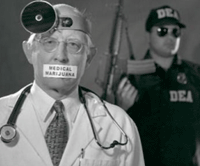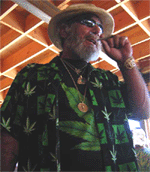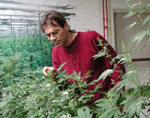Feature Archives
Tue Mar 1 2005
Eddy Lepp Finally Gets a Day in Court
Eddy Lepp's next court date will be March 14th at 9am. He is still being held, in lockdown, at the Santa Rita Jail, and has been visited by very few people. Read more He is facing multiple life sentences, as is Daniel Barnes.
March 2nd: Eddy Lepp and Daniel Barnes will be arraigned together tomorrow morning at 9:30am.
February 28th: Eddy Lepp finally saw a judge in a Federal Court in San Francisco today. Lepp's federal defender, David Fermino, explained in court that Lepp is an ordained minister and represents a religious group and that his prosecution "runs afoul of First Amendment and other Constitutional protections." The Judge, who declined to release Eddy Lepp on bond, is forwarding the case on to another magistrate. In court today, Eddy repeated an earlier request that the jail allow his family to send him necessary denture adhesive. He said he would raise lack of proper dental treatment and restricted access to legal material as arguments for release. "...can I get the stuff so I can at least eat, please," said Lepp, holding back tears. "That's not my call," replied James coolly. "I don't control the prison, Mr. Lepp." Daniel Barnes, who allegedly delivered a pound of cannabis to an undercover agent, was also arrested on February 16th, and was released on bond on February 25th. | Coverage of the February 16th arrests at Eddy's Medicinal Gardens | 2/28 Report by Ann Harrison
Eddy Lepp is reportedly set to enter a plea when he appears in front of Magistrate Joseph Spero for an arraignment on Wednesday March 3 at 9:30 am. Lepp will appear again in front of Judge Marilyn Patel on Monday March 7th at 9:30 am. The judge will be asked to decide whether Lepp can defend himself and hear an appeal of his detention and denial of bond. Lepp said last Friday that he plans to represent himself in court to fight federal marijuana cultivation charges that could condemn him to five life sentences. Lepp intended to argue that his cannabis crops, which have been taken twice by the DEA, were not only lawful, but also were an expression of religious freedom. Lepp was arrested at his home in Lake County on February 16 and has been in custody ever since. Eddy Lepp's arraignment and bail hearing scheduled for Wednesday morning February 23rd at 9:30am had to be rescheduled because Eddy sustained a fall. Read more
March 2nd: Eddy Lepp and Daniel Barnes will be arraigned together tomorrow morning at 9:30am.
February 28th: Eddy Lepp finally saw a judge in a Federal Court in San Francisco today. Lepp's federal defender, David Fermino, explained in court that Lepp is an ordained minister and represents a religious group and that his prosecution "runs afoul of First Amendment and other Constitutional protections." The Judge, who declined to release Eddy Lepp on bond, is forwarding the case on to another magistrate. In court today, Eddy repeated an earlier request that the jail allow his family to send him necessary denture adhesive. He said he would raise lack of proper dental treatment and restricted access to legal material as arguments for release. "...can I get the stuff so I can at least eat, please," said Lepp, holding back tears. "That's not my call," replied James coolly. "I don't control the prison, Mr. Lepp." Daniel Barnes, who allegedly delivered a pound of cannabis to an undercover agent, was also arrested on February 16th, and was released on bond on February 25th. | Coverage of the February 16th arrests at Eddy's Medicinal Gardens | 2/28 Report by Ann Harrison
Eddy Lepp is reportedly set to enter a plea when he appears in front of Magistrate Joseph Spero for an arraignment on Wednesday March 3 at 9:30 am. Lepp will appear again in front of Judge Marilyn Patel on Monday March 7th at 9:30 am. The judge will be asked to decide whether Lepp can defend himself and hear an appeal of his detention and denial of bond. Lepp said last Friday that he plans to represent himself in court to fight federal marijuana cultivation charges that could condemn him to five life sentences. Lepp intended to argue that his cannabis crops, which have been taken twice by the DEA, were not only lawful, but also were an expression of religious freedom. Lepp was arrested at his home in Lake County on February 16 and has been in custody ever since. Eddy Lepp's arraignment and bail hearing scheduled for Wednesday morning February 23rd at 9:30am had to be rescheduled because Eddy sustained a fall. Read more
Mon Feb 28 2005
HHS Heat Campaign To Reschedule Medical Marijuana
Marijuana is classified as Schedule 1, which means it has no recognized medical use. ASA is challenging the Department of Health & Human Services (HHS) to review its data and issue a statement that marijuana has medical value. The U.S. Department of Health and Human Services ("HHS") has blocked legal action to make marijuana available to bona fide medical patients under their physicians’ supervision. ASA says that in so doing, HHS repeatedly misstates the scientific evidence and ignores numerous reports and studies demonstrating the medical utility of marijuana and its constituent compounds. HHS disseminates these misstatements in correspondence and government websites. The Department of Health and Human Services has requested two 60-day extensions to respond to the Data Quality Act petition.
January update | 12/8 extension granted | October 5th rally to demand rescheduling
ASA has come up with several actions to encourage the Department of Health and Human Services to give a response on the petition that was presented to them on October 5, 2004. ASA is asking for people's help in doing the following: circulating the Citizen's Petition to Reschedule, writing to Michael Leavitt, the Secretary of Health and Human Services to ask him to stop delaying safe access, and by sending testimonial to ASA to to detail how cannabis has helped real people, to give a clear picture of what having safe access to cannabis means in affected people's lives.
ASA's Data Quality Challenge to HHS | Read more
ASA has come up with several actions to encourage the Department of Health and Human Services to give a response on the petition that was presented to them on October 5, 2004. ASA is asking for people's help in doing the following: circulating the Citizen's Petition to Reschedule, writing to Michael Leavitt, the Secretary of Health and Human Services to ask him to stop delaying safe access, and by sending testimonial to ASA to to detail how cannabis has helped real people, to give a clear picture of what having safe access to cannabis means in affected people's lives.
ASA's Data Quality Challenge to HHS | Read more
Mon Feb 21 2005
2/22 Debate About Drug Courts in San Francisco

 San Francisco District Attorney Kamala Harris and Public Defender Jeff Adachi discussed "Progressive Solutions to Drug Crimes in San Francisco" on Tuesday, February 22nd. The event was presented by the Harvey Milk Lesbian, Gay, Bisexual, and Transgender Democratic Club and moderated by Club president Greg Shaw. It took place in the Women's Building in San Francisco. The Club says that the debate will focus on effective and compassionate alternatives to prosecution and jail for drug-related crimes.
San Francisco District Attorney Kamala Harris and Public Defender Jeff Adachi discussed "Progressive Solutions to Drug Crimes in San Francisco" on Tuesday, February 22nd. The event was presented by the Harvey Milk Lesbian, Gay, Bisexual, and Transgender Democratic Club and moderated by Club president Greg Shaw. It took place in the Women's Building in San Francisco. The Club says that the debate will focus on effective and compassionate alternatives to prosecution and jail for drug-related crimes.
The Drug Court, which has been in existence for ten years, funnels about 200 people per year who face criminal prosecution for drug possession, small drug sales, and non-violent felonies into six-month drug rehabilitation and jobs programs. Harris's office says that while Drug Court has many success stories, many candidates are repeat offenders abusing the system. She claims that drug dealers and potentially violent criminals are avoiding jail by taking advantage of loopholes in a city program that diverts drug addicts out of prison and into rehabilitation, according to the District Attorney's Office. She has said that she wanted to exclude anyone with a history of drug dealing from Drug Court. "They'll go back to this revolving door, get arrested, spend time in jail, get out and can't work because of the conviction and go back to selling drugs," Public Defender Jeff Adachi said. He maintains that has seen no evidence of people abusing the program.
Read more | Harvey Milk Club website
Wed Feb 16 2005
Eddy Lepp Arrested for Having Cannabis on Property
February 17th, 2005: Eddy Lepp and Daniel Barnes were in Federal District Court in San Francisco today. They were arrested at Lepp's home in Lake County on February 16. Mary Otte, an assistant to Jack Herer, and documentary filmmaker Jason Dunlap were also arrested during the early morning raid on Lepp's house. Dunlap and Otte were later released, but the DEA seized all of the footage for Dunlap's planned documentary on Lepp. Lepp and Barnes were charged with distribution of marijuana, conspiracy to distribute marijuana and maintaining a premise for the purpose of cultivating marijuana. According to the criminal complaint, an undercover DEA Task Force Officer met with Lepp on January 19, 2005 and negotiated the purchase of one pound of dried and processed marijuana. The undercover officer was wearing a concealed transmitting device which was monitored and recorded by other DEA agents who observed the meeting.
The DEA alleges that Lepp told the undercover officer that he "possessed a strain of cannabis that would make White Widow pale in comparison." The criminal complaint states that Lepp agreed to sell "the one pound of high THC marijuana" for $2,500. Barnes, allegedly acted as a go-between delivering the one pound of marijuana to the undercover officer and taking receipt of the $2,500. "At no point during the negotiations was the subject of 'medical' marijuana raised by either party," the DEA says. Read more
February 16th, 2005: Dale Gieringer of CA NORML reported today that Eddy Lepp and one or two other people were arrested this morning at Eddy's home in Lake County. Federal Drug Enforcement Agency officers allegedly detained Eddy because marijuana clones were found growing on the property. Eddy, who was recently on a 3-week hunger strike in protest against the charges against him from his arrest last summer arrest last summer, has likely been transported to the Federal Building in San Francisco, and it is expected that he will be arraigned in Federal Court.
Eddy is a medical marijuana farmer, minister, and caregiver through his organization Eddy's Medicinal Gardens. A reading of California's Compassionate Use Act of 1996 says, "(California Health & Safety Code) Section 11357, relating to the possession of marijuana, and Section 11358, relating to the cultivation of marijuana, shall not apply to a patient, or to a patient's primary caregiver, who possesses or cultivates marijuana for the personal medical purposes of the patient upon the written or oral recommendation or approval of a physician." SB 420 says, "A person with an identification card or a primary caregiver with an identification card shall not be subject to arrest for possessing eight ounces or less of dried marijuana per person with an identification card, and maintaining six or fewer mature or 12 or fewer immature marijuana plants per person with an identification card."
Mon Feb 14 2005
Americans for Safe Access Files Lawsuit Against CHP and Governor
At 10am on Tuesday, February 15th, Americans for Safe Access (ASA) announced at a press conference that it was filing a lawsuit against the California Highway Patrol (CHP) and Governor Arnold Schwarzenegger. The seven legal medical marijuana patients and caregivers whom ASA is representing say that the CHP broke the law in confiscating their marijuana during traffic stops. Read more
Over eight years have passed since the passage of the Compassionate Use Act (CUA, formerly known as Proposition 215) in 1996, where California voters approved the use of marijuana for medical purposes. Since then, the California legislature has enacted law (SB 420) that clarifies the CUA and explicitly allows for transportation of marijuana by qualified patients and caregivers. Local law enforcement in California has exhibited ongoing resistance to enforcing state law, despite the enactment of both the CUA and SB 420. "Out of Compliance" is a report that was issued last August by Americans for Safe Access. It states that the worst law enforcement offender of state medical marijuana laws in the state is the California Highway Patrol. ASA is suing the CHP to change its official policy, which says, “[e]ven if a Section 11362.5 H&S claim is alleged, all marijuana shall be confiscated and booked as evidence.” The only state-required documentation of legal patient status is a copy of a current doctor's recommendation, which the CHP calls an 'alleged' claim. ASA succeeded in winning back several patients' medicine and plants last year from a variety of arrests all over the state.
California Highway Patrol | Americans for Safe Access | CHP Policy on Medical Marijuana
Over eight years have passed since the passage of the Compassionate Use Act (CUA, formerly known as Proposition 215) in 1996, where California voters approved the use of marijuana for medical purposes. Since then, the California legislature has enacted law (SB 420) that clarifies the CUA and explicitly allows for transportation of marijuana by qualified patients and caregivers. Local law enforcement in California has exhibited ongoing resistance to enforcing state law, despite the enactment of both the CUA and SB 420. "Out of Compliance" is a report that was issued last August by Americans for Safe Access. It states that the worst law enforcement offender of state medical marijuana laws in the state is the California Highway Patrol. ASA is suing the CHP to change its official policy, which says, “[e]ven if a Section 11362.5 H&S claim is alleged, all marijuana shall be confiscated and booked as evidence.” The only state-required documentation of legal patient status is a copy of a current doctor's recommendation, which the CHP calls an 'alleged' claim. ASA succeeded in winning back several patients' medicine and plants last year from a variety of arrests all over the state.
California Highway Patrol | Americans for Safe Access | CHP Policy on Medical Marijuana
Fri Feb 11 2005
Employers Might Not Get Pissed as Often if Industry Gets its Way
In 1990, the U.S. Supreme Court ruled that drug testing without suspicion of use does not violate the Constitution's Fourth Amendment protections against unreasonable searches. Executive and judicial moves paved the way for the unprecedented growth of workplace drug testing within the public and private sector. About 50% of large employers today require drug testing as a predocndition to employment. About 400,000 of the nation's 1.6 million or so federal workers suffer through some form of drug screening.
Going along with increasing incidences of drug testing, companies that claim to be able to perform unconventional drug screens of citizens' hair, sweat, and saliva have emerged, each proclaiming its new state-of-the-art technology to be the "heir apparent to the piss cup." For the most part, however, employers have been unconvinced. Thanks to groups such as DATIA, the Drug & Alcohol Testing Industries Association, things may be about to change. The group's mission of late has been to push the U.S. Department of Health and Human Services to amend the federal workplace guidelines so federal agencies can conduct drug screenings of employees' hair, sweat, and saliva, since current federal law requires sole reliance on the testing of urine. DATIA is hopeful that a change like this might get private employers to start using alternative specimen technology. The Department of Health and Human Services' Substance Abuse and Mental Health Services Administration (SAMHSA), has criticized the new technologies as seriously flawed.
This is where lobbyists and the the legislative branch of the U.S. government come in. H.R. 3922 was introducted in the House of Representatives last year. It would have amended title 23 of the United States Code, "relating to improving safety and enforcement with respect to individuals operating motor vehicles while under the influence of, or having used, drugs." However, rather than being in a "drugged" state, subjects need have only tested positive for inert drug metabolites (which, in the case of marijuana, could linger in the urine for days or even weeks after smoking) to be found guilty. H.R. 3922's purpose seemed to be to criminalize otherwise non-criminal behavior, i.e., driving while sober. The measure did not become law, but that does not mean that similar attempts at legislating more invasive and frequent drug testing will not be made this year!
Read more
Going along with increasing incidences of drug testing, companies that claim to be able to perform unconventional drug screens of citizens' hair, sweat, and saliva have emerged, each proclaiming its new state-of-the-art technology to be the "heir apparent to the piss cup." For the most part, however, employers have been unconvinced. Thanks to groups such as DATIA, the Drug & Alcohol Testing Industries Association, things may be about to change. The group's mission of late has been to push the U.S. Department of Health and Human Services to amend the federal workplace guidelines so federal agencies can conduct drug screenings of employees' hair, sweat, and saliva, since current federal law requires sole reliance on the testing of urine. DATIA is hopeful that a change like this might get private employers to start using alternative specimen technology. The Department of Health and Human Services' Substance Abuse and Mental Health Services Administration (SAMHSA), has criticized the new technologies as seriously flawed.
This is where lobbyists and the the legislative branch of the U.S. government come in. H.R. 3922 was introducted in the House of Representatives last year. It would have amended title 23 of the United States Code, "relating to improving safety and enforcement with respect to individuals operating motor vehicles while under the influence of, or having used, drugs." However, rather than being in a "drugged" state, subjects need have only tested positive for inert drug metabolites (which, in the case of marijuana, could linger in the urine for days or even weeks after smoking) to be found guilty. H.R. 3922's purpose seemed to be to criminalize otherwise non-criminal behavior, i.e., driving while sober. The measure did not become law, but that does not mean that similar attempts at legislating more invasive and frequent drug testing will not be made this year!
Read more
Tue Feb 8 2005
Medical Marijuana Week 2005
Americans for Safe Access and the California Marijuana Party will be sponsoring a variety of events during Medical Marijuana Week, from February 12th-19th. Events are planned in cities all over the Bay Area that week, ranging from a party in a bar to seed planting to court dates, and more. Events will include a women's caucus, a veterans' action, benefits, and the 2nd Annual 215 Bash, which will honor Ed Rosenthal. Report about the week's events | Full list of events | Poster
Americans for Safe Access | California Marijuana Party
Americans for Safe Access | California Marijuana Party
Drug War:
 22
22








